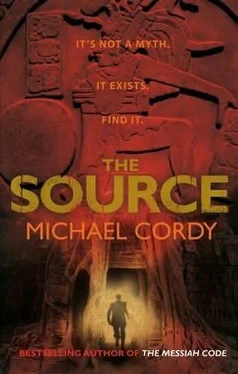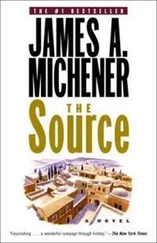Michael Cordy - The Source
Здесь есть возможность читать онлайн «Michael Cordy - The Source» весь текст электронной книги совершенно бесплатно (целиком полную версию без сокращений). В некоторых случаях можно слушать аудио, скачать через торрент в формате fb2 и присутствует краткое содержание. Жанр: Триллер, на английском языке. Описание произведения, (предисловие) а так же отзывы посетителей доступны на портале библиотеки ЛибКат.
- Название:The Source
- Автор:
- Жанр:
- Год:неизвестен
- ISBN:нет данных
- Рейтинг книги:5 / 5. Голосов: 1
-
Избранное:Добавить в избранное
- Отзывы:
-
Ваша оценка:
- 100
- 1
- 2
- 3
- 4
- 5
The Source: краткое содержание, описание и аннотация
Предлагаем к чтению аннотацию, описание, краткое содержание или предисловие (зависит от того, что написал сам автор книги «The Source»). Если вы не нашли необходимую информацию о книге — напишите в комментариях, мы постараемся отыскать её.
The Source — читать онлайн бесплатно полную книгу (весь текст) целиком
Ниже представлен текст книги, разбитый по страницам. Система сохранения места последней прочитанной страницы, позволяет с удобством читать онлайн бесплатно книгу «The Source», без необходимости каждый раз заново искать на чём Вы остановились. Поставьте закладку, и сможете в любой момент перейти на страницу, на которой закончили чтение.
Интервал:
Закладка:
'They found nothing?' said Hackett. 'No stem-cell promoters? Nothing that might explain how it repairs DNA?'
The nun shook her head.
'I suspect that what drives life in this place is a precursor to DNA,' said Ross.
Hackett thought for a moment. 'You mean this whole place could be working on something like RNA? Or something even more primitive?'
'Whatever's the most primitive form of life,' said Ross. 'As a geologist the only way I can explain this place is if it's a throwback to when life first began on Earth. It may even be the place where life began. If DNA is like the Microsoft Windows software of life, then whatever's behind this garden is DOS or whatever came before that. This is the base programming behind DNA. The stuff that makes DNA. It might not exist anywhere else in the world. That's why labs can't detect it. They've never seen it before. They've no idea what they're looking for.'
Hackett was nodding. 'It seems as if every organism here has evolved different phenotypes from those in the outside world. Part of that could be environmental, due to its isolation, but a greater part could be that it stems directly from a more primitive genotype.'
'What the hell's the difference between a phenotype and a genotype?' asked Zeb.
'A genotype is an organism's genetic makeup, its book of instructions,' said Hackett. 'A phenotype is its physical form, what it looks like, determined by genes and environment. For example, your hair, skin and eye colour are largely determined by your genotype but expressed in your phenotype. The point is most creatures have evolved separate genotypes and phenotypes. The human genotype, for example, uses its phenotype to survive – by making our bodies want to have sex so we pass on our genes. But many evolutionary biologists believe that the first living organisms were so basic they were just bundles of instructions. The genotype was the phenotype. The software was the hardware. There was no secondary body. If life here is as primitive as Ross believes, then the base genotype, the original instructions for life, might still exist in its primal form, whatever that is.'
'This place can't be explained by science,' said Mendoza, solemnly. 'It's sacred. It's too important to be left to scientists or businessmen. Only the Church can know what's best for a place like this.'
'Which church?' said Sister Chantal.
Mendoza frowned disapprovingly. 'You're a Roman Catholic nun. There's only one church that can decide what's best for this place.'
Sister Chantal shook her head. 'A great man, a priest, once said that this place was the Garden of God and I believe him. It is sacred. Too sacred for any church or religion to control.' She gave a weary sigh. 'Let me tell you how this place was discovered and why my friends, Ross and Zeb, accompanied me here.' For the next few minutes she talked about Orlando Falcon, the Voynich, Lauren Kelly and Father General Leonardo Torino. Hackett and Mendoza listened, rapt, until she was finished.
But Mendoza was unconvinced. 'Sister, you'd rather entrust the future of this garden to a woman lying unconscious in hospital than to your own church?'
'Once Lauren Kelly has been cured I can hand over my burden. I'm simply fulfilling my vow. No more, no less. All I ask is that you fulfil yours.'
Hackett turned to Ross. 'You think the Father General could have been behind your wife's injury?'
'I've no proof, but I wouldn't put it past him after what happened with the bandits on the river.'
'But he's a senior officer of the Roman Catholic Church!' said Hackett.
'Then I guess they must really want this place.'
'So when do we leave?' asked Zeb.
'Tomorrow. We'll return first to the lost city.' Sister Chantal turned to Hackett and Mendoza. 'For your gold. Then Ross, Zeb and I shall go back to America.'
Hackett laid a hand on Ross's shoulder. 'We may have lost Juarez,' he said sadly, 'but it appears our trip into the jungle wasn't totally in vain. We all found what we were looking for.'
'Yes, I suppose we did.' But even as he said it, Ross thought of the light emanating from the tunnel of blood: the source. It was now clear that the garden and its unusual life forms were merely physical expressions of the miraculous powers that had drawn him here. The true source of the miraculous garden, and possibly life itself, was what Hackett had called the base genotype. And when he thought of its power and his desire to ensure Lauren's recovery, he realized that, despite the crystal in his bag, he might not have everything he had come for. Not yet, anyway.
55
The next morning Ross woke early and while the others slept he stole into the forbidden caves. He wasn't sure what he hoped to achieve, only that he had to explore the caves one last time before he left. As he entered, he wondered how old they were. He guessed that radioactive dating would place them at, or near, the dawn of creation.
In the half-light he saw two white figures in the pool, picking shards of crystal rock from the water and gnawing at them with small but impressively sharp teeth. Their translucent flesh seemed to pulse in the gloom. Immediately they saw him, they stopped and opened their mouths in song. Their voices filled the cave, building in a crescendo, then stopped abruptly. They didn't move, just watched him. So he mimicked their singing, note for note.
They opened their mouths again. This time they sang a higher, more complex sequence of notes.
Again Ross copied it.
One of the nymphs came closer. It had red flowers in its frondlike hair. Its mouth widened and a chattering sound came from it, like laughter. Close up the creature was disconcerting. Its large eyes reminded him of a Disney cartoon, but when he looked into them he couldn't see any emotion – any connection. Its mouth, full of sharp animal teeth, confirmed that it was no human. And yet, when he copied its sounds, it responded. He wondered if Orlando Falcon, the brilliant linguist and communicator, had done something similar all those centuries ago. Had he formed a bond with these creatures, especially after the conquistadors had been killed? Were they his only companions while he was stranded in this strange, dangerous paradise? Had he come to see them as a simpler, more innocent version of humanity, harking back to a time before we were corrupted?
Ross tried an experiment. He created his own sound – but as soon as he uttered the first note he knew it wasn't original. He was unconsciously reproducing the alien scales from Spielberg's Close Encounters of the Third Kind. But when he stopped, the nymph copied him. Perfectly.
He tried another tune: the James Bond theme. Again the nymph reproduced it immaculately. Now more of them were emerging from the gloom, all keen to watch the parlour game.
He waited and his new friend, the nymph with red flowers in its hair, made another series of sounds. Unlike Ross's movie scores, the nymph's notes sounded random with no discernible tune or melody, the difference between prose and poetry. Nevertheless, he repeated the sequence and the nymphs resumed their laughter-like chattering.
He had begun to hum the Pink Panther theme, when a scream stopped him. The short, piercing sound made his skin crawl. The nymphs fell silent and turned as one to the back of the cave. Ross followed their gaze. In the gloom, among the mass of tubular stems, he saw one of the pods open to reveal a nymph with a huge, distended belly. Between its spread legs, curled in a foetal ball, was another nymph, greyer in colour but not much smaller than the mother – if that was what it was. The 'child' moved, and three of the watching nymphs lifted it from the pod and carried it to one of the pools, where they ground up shards of crystal between their teeth and fed it to the newborn, mouth-to-mouth. As it swallowed their offerings, it brightened to the radiant white of the others.
Читать дальшеИнтервал:
Закладка:
Похожие книги на «The Source»
Представляем Вашему вниманию похожие книги на «The Source» списком для выбора. Мы отобрали схожую по названию и смыслу литературу в надежде предоставить читателям больше вариантов отыскать новые, интересные, ещё непрочитанные произведения.
Обсуждение, отзывы о книге «The Source» и просто собственные мнения читателей. Оставьте ваши комментарии, напишите, что Вы думаете о произведении, его смысле или главных героях. Укажите что конкретно понравилось, а что нет, и почему Вы так считаете.





![Джеймс Купер - Пионеры, или У истоков Саскуиханны [The Pioneers, or The sources of the Susquehannah]](/books/395797/dzhejms-kuper-pionery-ili-u-istokov-saskuihanny-t-thumb.webp)






